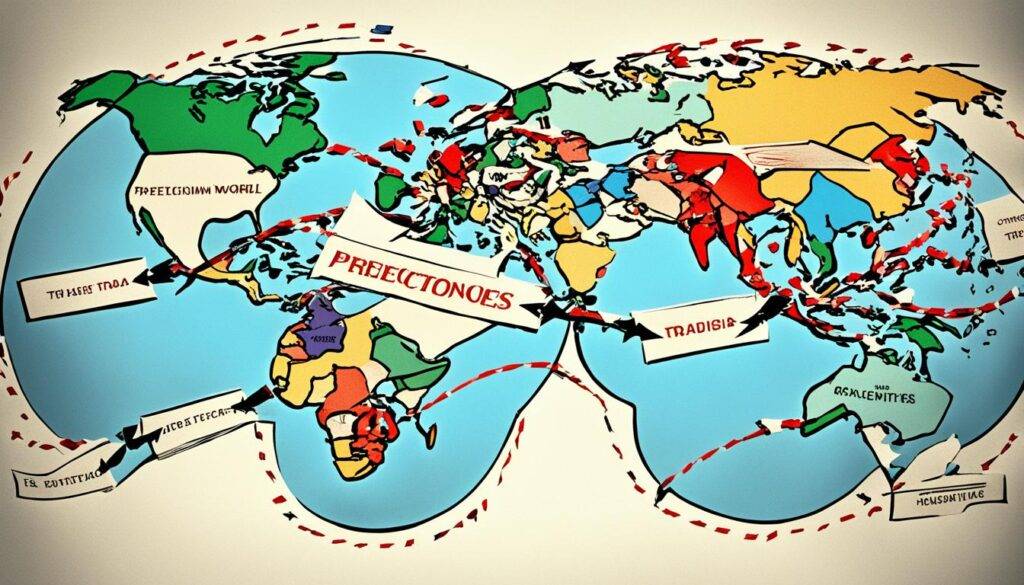Global Economic Policies play a significant role in shaping the investment landscape worldwide. These policies encompass the economic policy framework adopted by countries and the strategies they employ to promote economic diplomacy. Understanding the impact of these policies is essential for investors seeking to navigate the ever-changing global market.
Global Economic Policies provide a framework that guides countries in making strategic decisions to enhance their economic growth and stability. These policies encompass a wide range of measures, including fiscal and monetary policies, trade regulations, and investment incentives. Governments develop and implement these policies to attract foreign investments, promote domestic industries, and foster economic cooperation with other nations.
Economic diplomacy, a key component of Global Economic Policies, focuses on promoting economic relations and negotiations between countries. It involves diplomatic efforts to secure favorable trade agreements, resolve disputes, and encourage investment flows. Through economic diplomacy, countries aim to create a mutually beneficial environment that fosters economic growth and prosperity.
Key Takeaways:
- Global Economic Policies have a profound impact on investment landscapes worldwide.
- These policies encompass economic governance, international regulations, and economic trade agreements.
- Economic diplomacy plays a crucial role in promoting economic cooperation and attracting investments.
- Understanding Global Economic Policies is vital for investors to make informed decisions.
- Investors should stay updated on policy changes and adapt their strategies accordingly.
The Importance of Economic Governance and International Economic Regulations
In the era of globalization, economic governance plays a pivotal role in shaping the global economic landscape. It encompasses the processes, institutions, and regulations that ensure effective management of economic activities at a national, regional, and international level. By establishing a framework for economic interactions, governance frameworks enable countries to effectively address economic challenges while fostering international cooperation.
International economic regulations are an integral component of economic governance and are designed to promote fairness, transparency, and stability in international trade and investment. These regulations govern various aspects of economic activities, including market competition, intellectual property rights, labor standards, and environmental protection. They provide a level playing field for businesses, protect consumers, and facilitate smooth cross-border transactions.
Global economic cooperation is at the heart of economic governance and international economic regulations. It involves collaboration among nations to address shared challenges and establish common rules and standards. This cooperation promotes harmonious economic interactions, reduces trade barriers, and encourages investments across borders. Through forums like the World Trade Organization (WTO) and regional trade agreements, countries engage in dialogue, negotiate agreements, and resolve disputes, fostering a more inclusive and prosperous global economy.

Economic Governance and Investment Decisions
The impact of economic governance and international economic regulations on investment decisions cannot be underestimated. By providing a stable and predictable economic environment, these frameworks instill confidence in investors, reducing risk and uncertainty. Investors are more likely to allocate their capital in countries with robust governance structures and well-defined regulations to protect their interests.
Moreover, economic governance frameworks and international regulations create a level playing field for businesses, ensuring fair competition and preventing monopolistic practices. This fosters a healthy business environment that attracts not only domestic but also foreign investments. As a result, countries with strong economic governance frameworks tend to experience increased foreign direct investment (FDI), job creation, and economic growth.
The Role of International Economic Regulations
International economic regulations facilitate market access by liberalizing trade and reducing trade barriers. This leads to increased opportunities for businesses to expand their market reach and explore new markets abroad. By establishing common rules and standards, these regulations facilitate trade negotiations, enhance market efficiency, and promote economic integration.
Furthermore, international economic regulations ensure the protection of intellectual property rights, which is crucial for fostering innovation and creativity. Intellectual property rights encourage businesses to invest in research and development, knowing that their proprietary knowledge will be safeguarded. This, in turn, drives technological advancements and economic progress.
The Benefits of Global Economic Cooperation
Global economic cooperation, spearheaded by economic governance and international economic regulations, offers numerous benefits. It enables countries to address shared challenges such as climate change, economic crises, and income inequality collectively. Through collaborative efforts, countries can develop sustainable policies, share best practices, and pool resources to tackle global issues.
Additionally, global economic cooperation fosters interdependence and connectivity among nations, leading to increased economic opportunities and prosperity. It promotes the exchange of goods, services, and knowledge across borders, stimulating economic growth and development. By working together, countries can leverage complementary strengths and expertise, creating win-win situations for all parties involved.
The Role of Economic Trade Agreements in Shaping Investments
Economic trade agreements play a crucial role in influencing investment decisions and shaping the global economic landscape. These agreements are bilateral or multilateral frameworks that establish the terms and conditions for trade and investments between participating countries. By removing barriers and creating a predictable business environment, economic trade agreements promote economic growth and enhance market access for businesses.
One key aspect of economic trade agreements is their impact on trade flows. By reducing or eliminating tariffs, quotas, and other trade barriers, these agreements facilitate the movement of goods and services across borders. This increased trade openness creates new opportunities for businesses to expand their markets and tap into new consumer bases. Consequently, investments in sectors that benefit from such trade agreements experience significant growth, leading to economic prosperity and job creation.

In addition to trade flows, economic trade agreements also influence market access for businesses. These agreements often include provisions that ensure fair and non-discriminatory treatment for foreign investors. By providing legal protection and guaranteeing equal market access, economic trade agreements instill confidence in investors, promoting cross-border investments. Companies can explore new markets, establish subsidiaries, and form partnerships more easily, knowing that their investments are safeguarded by the provisions of these agreements.
Furthermore, economic trade agreements contribute to the overall investment climate by fostering a stable and predictable business environment. The commitments outlined in these agreements provide a framework for economic cooperation and strengthen investor confidence. Additionally, the harmonization of regulations and standards across participating countries reduces compliance costs and streamlines business operations. This favorable investment climate attracts both domestic and foreign investments, driving economic development and creating employment opportunities.
In summary, economic trade agreements have a profound impact on investment decisions. They enhance trade flows, expand market access, and foster a favorable investment climate. As businesses navigate the complexities of the global economy, understanding and leveraging the opportunities presented by economic trade agreements is essential for sustainable growth and success.
Conclusion
In conclusion, the impact of Global Economic Policies on investments cannot be overstated. The economic policy framework and economic diplomacy play a significant role in shaping the investment landscape. Understanding and adapting to these policies is crucial for successful investment strategies.
Economic governance and international economic regulations are key drivers of global economic cooperation. They provide a regulatory framework that promotes stability and fosters trust among investors. Adhering to these regulations is essential for businesses seeking to navigate the complex global investment environment.
Furthermore, economic trade agreements have a profound influence on investment decisions. These agreements determine market access, trade flows, and overall investment climate. Being aware of the implications of these agreements is essential for businesses looking to expand internationally.
In summary, staying informed about Global Economic Policies and their implications is vital for investors and businesses alike. Embracing these policies and adapting strategies accordingly will lead to increased opportunities and sustainable growth in the ever-evolving global economy.



